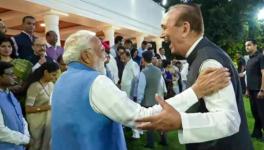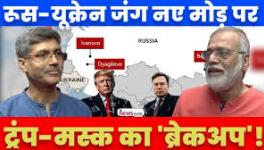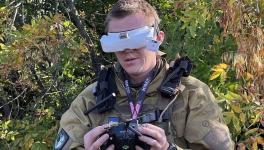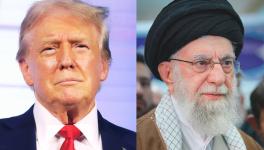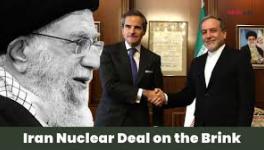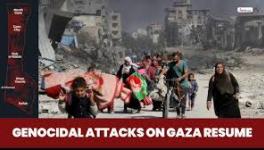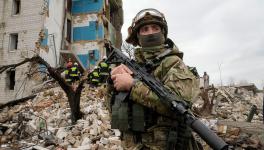Erdogan and Turkey in the Terror Net
How will ISIS terror attack affect Turkey’s relations in the region. Vijay Prashad discusses the Turkey's ambiguous position regarding Russia and the insurgency in Syria.
Rough Transcript:
Prabir Purkayastha (Prabir): Hello and welcome to Newsclick. This program with Real News. We have with us today Professor Vijay Prashad who as you know is a well known commentator on various issues. Vijay, good to have you with us.
Vijay Prashad (Vijay): Great to be here.
Prabir: Vijay, we have had the recent bombings in Istanbul. It's very clear now that this is the Caucasus group as it were which is now been known to have been aligned with the IS or Daesh as it is called. Do you think there is change between what Turkey was doing earlier with tacitly backing ISIS, and now ISIS coming back to bomb the Istanbul airport?
Vijay: Well, it is difficult to say exactly what happens with these groups because ISIS doesn't lay out the nature of relationship either with the Turkish government. Turkish government (also) doesn't talk about it's relationship. So it's hard to say what is changed. But what one can't intuit is – that certainly we know that since about 2012 if not earlier than, if not from 2011 -- the Turkish government was running a porous border. It in fact, encourage people to land at Mardin airport, to land at other airport, Gaziantep airport in South-eastern Turkey and take buses across border to join various rebel outfit inside Syria. Now, of course, some of these people particularly the big surge of people from Libya and Tunisia went and joined ISIS. One of the contradictory things, Prabir, of the American bombing of ISIS, is that when the American started bombing area, many of these people who went fully committed to this particular struggle turned around when back to Mardin, and back to Gaziantep, and took flights home. Some of them went to Istanbul. One of the curious things several years ago, a CIA person told me that in 2001 -2002, when the Americans went and bombed Afghanistan, he said, “We bombed with such force as if we were using a hammer to smash a phial of mercury and the mercury spread all over.” In a sense this is what bombing had done. It has sent people back. The Turkish government I think didn't anticipate what the CIA calls blowback
Prabir: You know, why you are saying this. There is other part of it that the Turkish and the CIA relationship with Caucasus as an anti-Russian move. Post Afghanistan there was this Jehadi outfits active in the Caucasus Beslan school attack and all of that and there is a lot of literature indicate that they were backed by the Americans who thought this is a good way to keep Russia on the boil as it was on the backfoot and a lot of this really also is accessed with turkey. In fact, the Caucuses relations with CIA was operative through Turkey. The person who have been named, Akhmad Chattayev he has been given as you know sanctuary in Austria though he recognizes the terrorists in Russia. They have asked for his extradition and they were refused, Austria gave him sanctuary. So all of this would indicate there is deeper Turkish Caucuses link that has been active aimed at Russia and also aligned later on to the ISIS they have developed. This axis is likely to change a, with the now the letter that Erdogan has sent to Putin and Putin's immediate immediate response immediate lifting sanctions etc. do you think this indicates change Turky's relationship with the groups and therefore, the bombing or is it something which is unpredictable by nature of this group.
Vijay: I appreciate you putting a longest story. You can even go further back. It may not just be 2003 when the Dagestan, Chechnya these areas have been under pressure from Saudi influence from the 60s and 70s fully backed by the CIA in order to put pressure on the Soviet Union. One of the reasons they created the world Muslim League in 1962 was to build resistance to the idea that communism can flourish in countries where there are Muslims. That was one of the big things. If I have to take a map and plot the areas where the World Muslim League in the 60s and 70s operated and looked today for the so called reservoirs of extremism from Philippines to Dagestan the map is very similar. The countries from the 60s that have been in a way bred to enter into this machination that continuing to bear fruits when they want to bear them -- that is against the Soviets in Afghanistan. In the 70s perhaps against Syria in the 2012 period onwards, it bears fruits. But then it is unpredictable, it can not be...
That day the Erdogan government did a smart thing, it normalized with Israel and they had this new equation with Russia. These fellows acted very quickly that had taken some time to prepare. I think there is some level of unpredictability. I don't think they were exactly reacting to new equation with Russia. There is unpredictability. The Turks have this ambition and have had for along time. It goes to even Ukraine where there are some Turkmen population. There is a contradictory and complementary nature of the entanglement. Just as Syria (there) is utterly contradictory entanglement. On the one side, they facilitated the growth of ISIS. Then they are against the Kurds. Then Americans tell them you have to fight ISIS. Well, if they do that they have to join the Kurds. So they start bombing the Kurds.
Prabir: Agreed that the Syria map is a complex one. Each side having more than one alliance and then these alliance being against each other. That's a patchwork alliance cum competition in Syria. But leaving that out, just looking at the Caucasus-Turkey-American links, you have talked about Soviet Union and the interest of parties continues – (break up of) Soviet Union continues as break up of Russia. Part of it is also the pipe line issue. They had this BTC pipeline, they wanted to block the Baku-Ceyhan-Tbilisi pipe line. The reality is the Americans were never were serious about giving Russia a place at the high table, as Russia thought it would get after Soviet Union had fallen -- they thought they could make up with the West. As is very clear, the whole containment of Russia breaking up of Russia, with the Caucasus link continued, with Turkey as a very important player. Once it morphs into ISIS and Syria -- and the Chechen as you know have number of groups operating in Syria – that this has become a major issue. You talked about Turkmenistan issue, the Turkmen population, which is there in large part of Central Asia don't speak, the same Turkish language -- they really speak different languages – then Turkey talks or the Turkmen population in Syria. (When Turkey talks about Turkmen population) they are really talking about Chechen, Dagestan and so on. So this has been much longer play isn't it?
Vijay: I mean it's not only a much longer play. Two other aspects, you laid it very well: there are these thorn in the sides of Moscow not only in this NATO expanding eastward beyond the borders of Germany, which is a violation of Baker-Shevardnadze agreement for the unification of Germany. Not only this eastward expansion of NATO but there has also been this thorn in the side of Russia, Moscow through the Caucasus here and Central Asia there. Let's face it. What the West gets away with it is it every moment it acts as if it is reasonable. Historically people say, “Yes , yes of course they did the coup in Iran. We know that but now it is different.” At every juncture, as the history progresses, these things get revealed and then people say. “Okay yeah, that happened in the past. It's not happening in the present.” Of course, it is happening right along. You don't have one of the largest intelligent networks if you are not using it. This is how they used it.
Fair enough. That's the one aspect. But the other aspect is the aspect of Turkey. I mean Turkey despite the change from the regime of the Republicans then the military, that era – the change to the AKP party meaning Erdogan's Islamic Muslim Brotherhood-esque party, in spite this change they are still cold (war) warriors. I mean Erdogan for instance was very eager for the Turkish government to allow George Bush to use the landmass of Turkey from which to bomb Iraq in 2003, and it is only because his parliament voted against him that he then insisted on a second vote that prevented Turkey from being essentially the aircraft carrier that the Kurds had an objection -- the Iraqi Kurds. They are by instinct cold (war) warriors, the Turks. This is how the establishment or the apparatchiks function. They were the front line against the Soviet Union for several decades, the placing of missile etc. in Turkey. This was an issue. So why does one expect Turkey to not to be fundamentally cold warriorish when it comes to kind of new 21st century wars? Certainly, they are operating (similarly) now. The blow back from these things teaches nobody a lesson. Nobody seems to want to learn a lesson. You would have thought that the very creation of Al Qaeda which then came to threaten Saudi Arabia, would have sent a message to people in Riyadh in Saudi Arabia. May be it's not good idea to export our fellows overseas to go and learn or decide because they create problems at home. It taught them nothing. Then they did it again, then they will do it again. The lessons of history are not being learned by any of these people.
Prabir: Coming to this issue of now Turkey. It is very clear that Turkey has made overtures to Russia even before the bombing. Do you think now that the co-relation between Russia, Turkey is going to change vis -a-vis Syria, particularly the kind of open and porous borders it has had with ISIS, the flow of oil, paying for that oil in different ways and facilitating it. The pictures that you had of long truck lines going to Turkey, carrying oil, plus the fact that supply (of arms) has been flowing in the reverse direction. Do you think that that's going to stop now? Do you think that it will still continue in a contradictory way? Okay, we support Turkmen (rebels) but we will not support ISIS, we will not support Kurds wherever they are.
Vijay: You know, if you run and fall against barbed wire, the most difficult thing to do when you are struck in barbed wires is to get down from the barbed wire. You might remove one barb but then in that position you will get struck in another. In a sense, Turkeys' problem now is that it is basically completely jammed on to barbed wire. It will have a very hard time extricating itself from it's adventure inside Syria. Perhaps the Russian thing is a little bit of attempting to extricate itself. Perhaps. I don't think it is going to be easy for Turkey to walk the way from the mess that it has been part of producing. Perhaps, centrally part of producing. That's the first thing. But let's also, the second thing is you see how Turkey is played around with it's relationship with Israel. They cut a deal, they get angry. I don't think the Russians should assume from this overture, this letter, this lifting of sanctions that this means that everything is fine with Turkey. There is an erratic nature in the way with the Turks deal with certain powers. The way they have dealt with Israel I think should be instructive to the Russians that this is perhaps and may be the fact that they were both called normalized on the same day, should have sent the message to Moscow that don't get any ideas here. After all, one minute we are shaking hands with Israelis, the next minute we are abusing them in Davos. I think, it would be silly to assume that this lifting of sanctions (by Russia) is nothing if not a coma. It's definitely not a semi colon and certainly not a full stop.
Prabir: Thank you Vijay for this discussion on Turkey and for our viewers, Vijay's new book which is the “Death of the Nation and the Future of the Arab Revolution” is just out from LeftWord Books. It has a chapter on Turkey and it also has a chapter on Syria which is what we are going to discuss in the next segment.
DISCLAIMER: Please note that transcripts for Newsclick are typed from a recording of the program. Newsclick cannot guarantee their complete accuracy.
Biography: Vijay Prashad is a professor of international studies at Trinity College. Among the many books he has authored are The Darker Nations: A People's History of the Third World and Arab Spring, Libyan Winter. He also writes regularly for Asia Times Online, Frontline magazine and Counterpunch.
Get the latest reports & analysis with people's perspective on Protests, movements & deep analytical videos, discussions of the current affairs in your Telegram app. Subscribe to NewsClick's Telegram channel & get Real-Time updates on stories, as they get published on our website.











